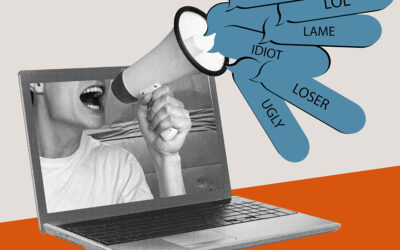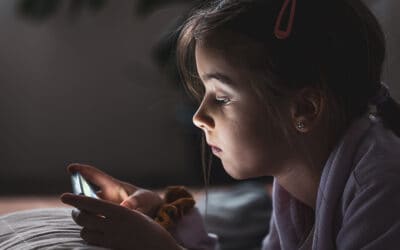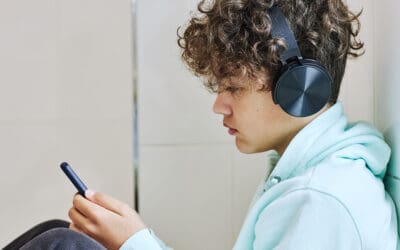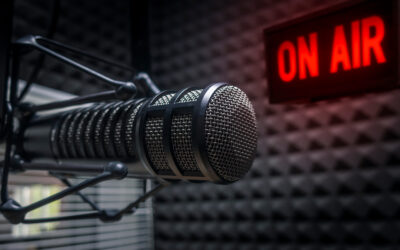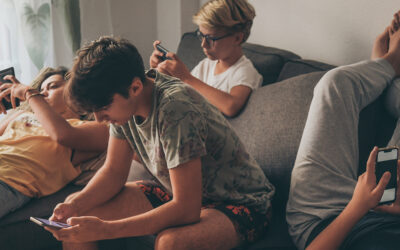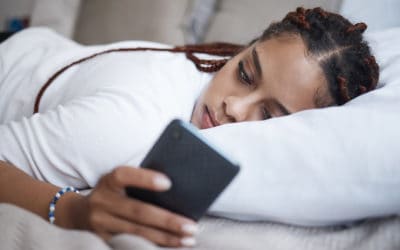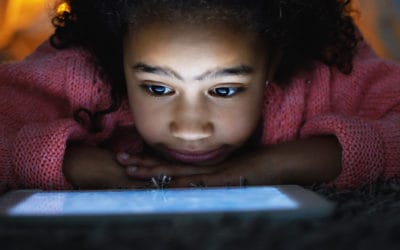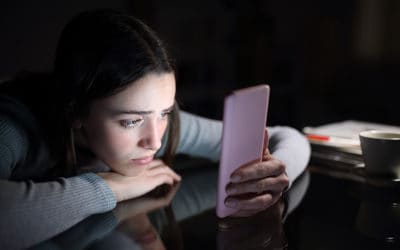
A Bedtime for Devices?

BLUE LIGHT?
Did you realize that screens emit a lot of blue light? What is blue light anyways? Light has different wavelengths which produce different colors, sometimes referred to as color temperature. Blue light is similar to the color temperature of daylight, it is a colder white in contrast with a warm white. And when our eyes are receiving blue light, a process designed by God takes place to tell our brains that it is daytime, and we should be awake and alert.
To get a little more technical, blue light in screens stimulate our eyes and brains which, in turn, suppresses a hormone known as melatonin. Melatonin is part of God’s design to help regulate our sleep cycles, technically known as our circadian rhythm, our biological clock.
How do you know when to go to sleep and when to wake up? Well, our bodies tell us when we’re ready. When melatonin is suppressed by blue light from screens, it causes the “light upstairs” to stay on longer as well. Blue light is not a bad thing since it is produced by the sun and causes us to be alert, but exposure to artificial blue light also causes us to be alert, when we’re not supposed to be.
THE NATURAL ORDER HAS BEEN UPENDED
The problem is that the natural order of things has been upended and now our eyes, and our brains are being affected hours beyond the time that the sun goes down. In ages past, people would light their homes with fire, with oil lamps, with candles which all produce a very low and warm light that actually makes you sleepy, and signals the brain to start winding down.
Any light source, including warm lighting can reduce the production of melatonin, but blue light is notorious for making things worse. The technology used to make our screens more energy efficient, also produces much more blue light. A Harvard sleep researcher, Stephen Lockley, points to light at night as one of the reasons many people are getting less sleep than their body needs.
All this time you thought that you’ve just had sleep problems, which could be true; yet, you’ve never made the connection with your nightly screen habits.
SET A BEDTIME FOR YOUR DEVICES BEFORE YOURS
Some experts have recommended setting a bedtime for your devices. Those times range from half an hour to 2 hours before bedtime so that your melatonin production can be in full effect while you’re winding down for bed.
SCREEN AND SLEEP TIPS
How about some screen and sleep tips? Turn on and adjust the night light settings on your phone, computer, or any other device with that functionality. It cuts down on some of the blue light, which can help a little, but not enough to solve all of the problems that come from screens disrupting your sleep.
I wish this were a no-brainer, but don’t sleep with your cellphone. In fact, it’s best to move all screens out of your bedroom. It can also help to replace any lights (including night lights) in your bedroom that may emit blue light, such as LED or fluorescent bulbs. Consider using warm incandescent lights instead.
Make sure your alarm clock has a red display instead or white or blue. The red light is less disruptive to your circadian rhythm. If using a phone as an alarm clock (which I don’t recommend because it’s better to have your phone away from you at night), put it on airplane mode, sleep mode, or do not disturb mode, to prevent any distractions while sleeping.
Instead of using a lit screen to read at night, print off articles or read the actual hard copy of books when possible.
THE NEED FOR SELF-CONTROL
Blue light is only one of the problems affecting our sleep when it comes to screens, it is also the lack of self-control to know when to turn your phone off and give your eyes and mind some rest from the constant drip of notifications, videos, posts, and whatever else keeps your eyes engaged late at night.
Try this following tip and see if it makes a difference and helps you get better sleep. First, set a personal bedtime based on when you must get up in the morning in order to be ready for school, or work and make sure you are getting at least 8 hours of sleep.
Depending on your age, you may need more sleep than that. The next step is to walk the time back at least an hour before your bedtime to be free from screens.
To put it simply, be sure your devices have a bedtime that is at least an hour before yours.
Then, keep your lights on low, pick up a good book, and read in bed. Now you may be wired differently but if I’m tired, reading a book will put me to sleep in minutes. Give this a try for a week and see if you sleep better and wake up more rested.
Psalms 4:8 “I will both lie down in peace, and sleep; For You alone, O LORD, make me dwell in safety.”


